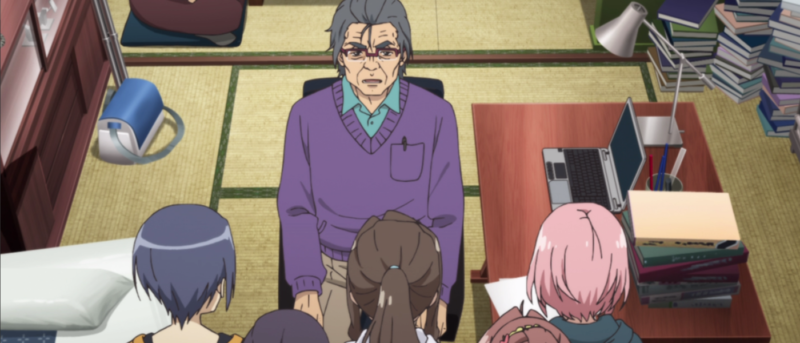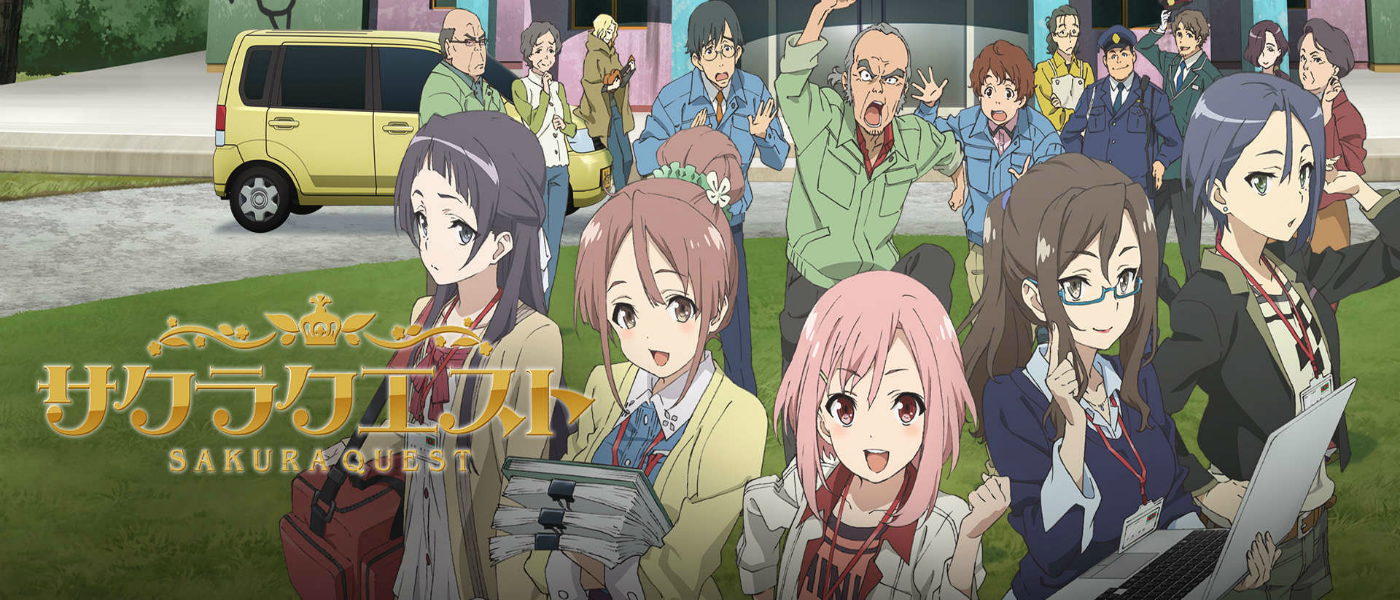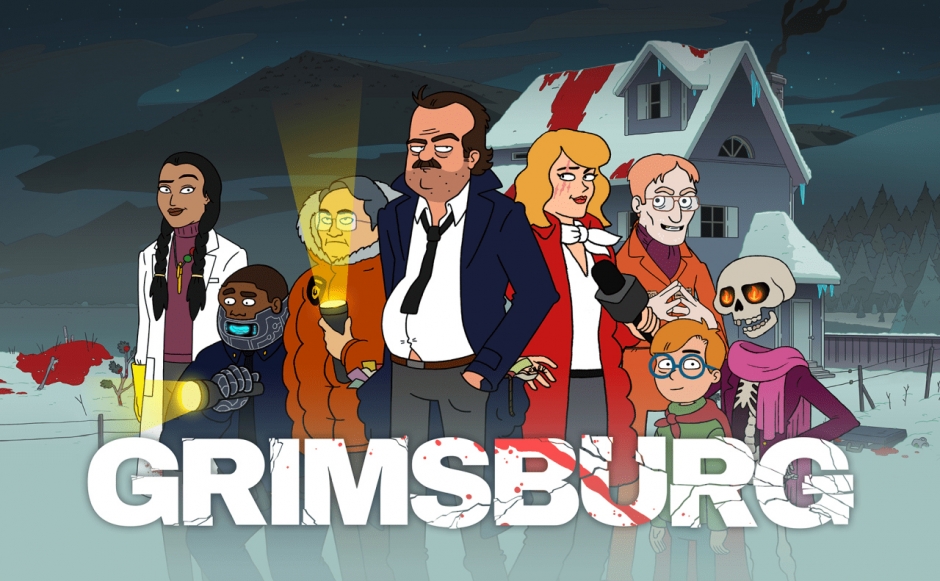English Dub Review: Sakura Quest “The Sphinx’s Antics”
Siri was the standout character in this episode.
Overview (Spoilers)
The search for the treasures of the Mizuchi Shrine lead the ministers to the remote retirement village of Warayiba. A wily anthropology professor there tells them that one is in one of the storehouses in the village, but doesn’t tell them its in his. In the meantime, the girls set to work improving the connection between Warayiba and Manoyama, using tablets that social workers left with the elderly. However, things take a nasty turn when the villagers take Yoshino hostage in protest of their bus route’s removal. Will the Queen survive these mummified dissidents?

This episode dealt with a few issues facing small towns that you normally wouldn’t think of. First, the isolation of the elderly. For the most part, the Warayibans had absolutely nothing to do and relied on the public bus to get to anywhere they could do their shopping. In big cities, it isn’t all that hard to get supplies to independent living communities, as shopping is well distributed through the city. Small towns, however, are pretty well centralized. All your shopping happens in one area. If the retirement communities are too far from that center, it can be really hard for them to get the essentials, and to take part in things for the town. The Professor really challenges the girls’ critical thinking in this problem and demonstrates to them that their “modern” thinking is shallow and inconsiderate. When one of them even says that all the Warayibans move closer to Manoyama, I just about gagged. You’re telling all these old people that if they want the fundamentals of life, they need to uproot and live where you tell them to be? What is this, the trail of tears?
The second issue addressed here is one that is currently a hot topic for debate in America: Self-driving cars, taxi apps, and their impact on the transportation industry. In Manoyama, there is one bus, one driver (Takamizawa). Even he has trouble getting enough fares from the Warayibans to justify his bus route. That is why the Warayiba stop is on the chopping block. Nowadays, with the advent of taxi apps, the public buses are a thing of the past. Why walk out to the stop, pay to ride to another stop and walk some more when you can simply call a Lyft and go straight there? This means that public transportation is only useful for regular commutes. Since public transportation is feeling their purse-strings tighten, eventually, they will need to trim the fat. Say hello to the self-driving car, and why Takamizawa is so feisty this episode. If the bus becomes self-driving, they no longer have to pay bus drivers to do the job. In America, the thought of shipping trucks and buses driven by computers would put millions out of work. Their primary marketable skill reduced to worthless, they would either have to transition to taxis (and taxi apps) or be unemployed. Some in the tech sector, like Leo Laporte, have commented that programming self-driving cars may become the new blue-collar job. So, while our first issue was something specifically about small communities, this episode also touches on a subject that affects the world, economically. Do you think that self-driving cars are a good thing? How would you solve the looming employment crisis that self-driving mass transit and shipping brings? Comment below! Let’s get a discussion going!
Lastly, the episode touches briefly on the concept of anonymity on the internet, and how it empowers people to say and do things that they normally wouldn’t. Really, this has been a problem since the internet first became a public thing. As soon as you had a screen name, you had a persona. That persona acted as a shield. Nobody knew who was saying this stuff, so you could speak your mind without tact. Nowadays, this has grown into debacles like GamerGate, where cyber bullying destroys- even ends- lives. The problem is, the only way to remove these shielding personas is to eliminate privacy, by forcing you to operate under your real name. There is a massive debate that has been going on for a while over the merits of internet privacy versus internet security. In Manoyama, they opted to have all the Warayibans operate under their own names since most of the connections were on a privately built app and the seniors were all new to this stuff anyway. But how would you feel if your various screen names and email addresses were forced into being your name? Would you care?
Our Take
So, wow, this episode is relevant to a couple hot-button issues and addresses them in an organic way, all growing out of an issue they discover while solving another issue. What I loved about it was how it showed almost all of the characters were affected (for the better) by the increased connection with the Warayibans. The woodworkers were inspired by one old carpenter who did complex work for fun. People found common interests with the elderly out there, and finally found outlets for their passions. Heck, it was really fun watching one of the seniors getting stumped by Sandal’s latest chess move. It’s a very subtle point that the episode is trying to make. When we isolate our seniors and ignore them, we miss out on lifetimes of knowledge, passion, and inspiration that could make our own lives better. It isn’t heavy-handed with this point. Nobody stands up and declares that this is going on. It just shows it. The show, don’t tell. It’s good storytelling. The only problem with it is that a good chunk of the episode was showing the girls teaching them how to use their tablets. While vital to the plot, it felt like the episode needed to break that up more with scenes with the Professor, to build up the tension for what comes at the end of the episode. This could have made the episode a bit more entertaining, though watching the “old butt-lover” try to get Siri to show him booty pictures was great.
Seeing the girls fail to solve the issue of the terminated bus stop is a tiny trip into their thought processes. Each one comes up with solutions intricately tied to their specialties and back stories. Sanae’s answer of forcing the elderly to move comes from her own past as a big city girl. She doesn’t believe in living away from where the action is. Ririko puts forward the tech solution because she’s a geek. Yoshino’s answer is just air-headed, make the bus drivers drive more efficiently. It shows a lack of understanding about the situation at hand, which seems to be her MO. Even in their failures, each character acts consistently without becoming a boring trope.
The animation is, as always, top notch. I didn’t really notice as much character and life behind it as I usually do, but everything moves smoothly. I didn’t notice any errors, and there weren’t many shortcuts like cycling speech frames. I had a bit of an issue with how some of the elderly characters looked, however: Their heads were oddly proportioned. Some of them were too big or too small for their bodies. Some had huge eyes. These strange proportions were consistent, so it wasn’t due to errors on the animators’ parts, it was designed for the characters. Given how good the character design has been in the show so far, it must be something intentional that BunBun and Kanami Sekiguchi were trying to do, but I can’t wrap my head around the shapes they created. They just looked odd.
SCORE
Summary
I like this episode a lot. It dealt with a ton of great topics, it had solid, character-based storytelling, and it had good work in its animation. I would have liked a bit more to keep the story active, but that just isn't what this show is about. I give it nine disproportionate old man heads out of ten.
























"There are also other characters that come and go (also owned by the Warner Bros. Discovery conglomerate media company)."
Huh. Is that just referring to other characters from the show itself, or is this implying that the new season is going to have cameos from other WBD IPs